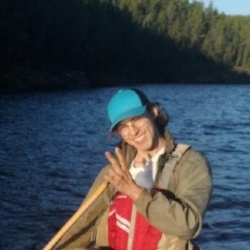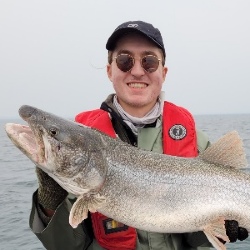Natural Sciences and Engineering Research Council of Canada
The Alexander Graham Bell Canada Graduate Scholarship administered by the NSERC provides financial support to high-caliber scholars who are engaged in master’s programs in the natural sciences or engineering. The award is valued at $17,500.
The Natural Sciences and Engineering Research Council of Canada funds visionaries, explorers and innovators who are searching for the scientific and technical breakthroughs that will benefit our country. They are Canada’s largest supporter of discovery and innovation. They work with universities, colleges, businesses and not-for-profits to remove barriers, develop opportunities and attract new expertise to make Canada’s research community thrive. They give Canadian scientists and engineers the means to go further because we believe in research without borders and beyond frontiers.
2019-2020 Award Recipient
 Jamie Card – Bioscience, Technology, and Public Policy Alumna
Jamie Card – Bioscience, Technology, and Public Policy Alumna
I was inspired to apply for this award as I was previously a recipient of an NSERC Undergraduate Student Research Award during my time at the University of Alberta which allowed me to undertake field research studying an invasive fish species in Southern Alberta. Realizing the funding opportunities that NSERC provided for students, I set a personal goal of applying for and receiving the Alexander Graham Bell CGS-M scholarship as a graduate student and was thrilled when I found out that I was a recipient of this award. This award helped me succeed as a graduate student as it funded an entire year of my studies. I would like to thank my graduate supervisor Dr. Caleb Hasler for his overall support and guidance and for acting as one of my references, and my previous supervisor Dr. Mark Poesch for introducing me to the world of fish research by hiring me as an undergraduate research assistant and for acting as my other reference when applying for this award.
My best piece of advice that I have to share from my time as a graduate student is to push yourself out of your comfort zone especially when it comes to connecting with and meeting new people. Making connections with the other students in my cohort and other professionals in my field was one of the most rewarding aspects of graduate school for me personally, and I highly encourage future graduate students in the program to do the same.
2021-22 Award Recipients
 Karl Friesen-Hughes – Bioscience, Technology, and Public Policy
Karl Friesen-Hughes – Bioscience, Technology, and Public Policy
First, I must acknowledge the lands where I have lived and studied for many years. In Winnipeg, we live on Treaty 1 territory, the traditional land of the Anishinaabeg, Cree, Oji-Cree, Dakota, Dene, and Métis people, who lived here before us and continue to live here. It is also important to acknowledge that our water is sourced from Shoal Lake 40 First Nation. My research is based at the International Institute for Sustainable Development – Experimental Lakes Area (IISD-ELA), so it is also important to pay respect to the Anishinaabe Nation and the rights holders of the Treaty 3 traditional territory which this site is located on.
Receiving a Canada Graduate Scholarship from the Natural Sciences and Engineering Research Council of Canada means I will be able to spend more time and energy focused on my project, which I am very grateful for. Receiving the NSERC gives me the confidence to know that people think I am doing good work, and it also encourages me and inspires me to work harder and prove that I earned this award.
I never thought that receiving the NSERC was something I could achieve, but I was able to thanks to the support from my amazing supervisor Dr. Nora Casson and my wonderful lab group. Also, I must thank my family and friends for supporting me, especially through the ups and down of this last year.
I think my biggest qualification for this scholarship was the work I did through my Honours thesis, which I did at the University of Winnipeg again with Dr. Casson. This project was focused on nitrogen and phosphorus dynamics in agricultural streams, and in collaboration with Dr. Casson and Dr. Henry Wilson, we were able to successfully publish our findings! All of the research assistant and teaching assistant jobs I have done have also helped me to build my skillset and academic connections. I think it also helped to have relevant volunteer experience from the Manitoba Museum, Canadian Young Hydrologic Society, and Let’s Talk Science.
I am excited to continue working on my project for the upcoming academic year! All of my field work is now complete, so I can shift focus to lab work and thesis writing. I am also very much cherishing getting to work on campus. It is so nice to see people and to not be working in the total isolation which engulfed my last year.
 Giulio Navarroli – Bioscience, Technology, and Public Policy
Giulio Navarroli – Bioscience, Technology, and Public Policy
I’m a first-year M.Sc. student in the Bioscience, Technology, and Public Policy program. My project is examining Manitoba’s recreational trout fishery, and whether current populations are overfished or not. I have more confidence in myself as a researcher after receiving this NSERC award knowing that there are many other amazing students and projects being conducted. Some of my past work involved conducting a comparative diet study of fishes in the St. Lawrence River, and creating a collaborative technical report for the Cree Nation of Mistissini on management strategies for walleye and brook trout. I would like to thank Dr. Caleb Hasler, Dr. Dylan Fraser, Dr. Anthony Ricciardi, and Sunci Avlijas for helping me develop into a young fisheries scientist. I look forward to network with other fisheries scientists around Canada, and learning a lot about lake trout!